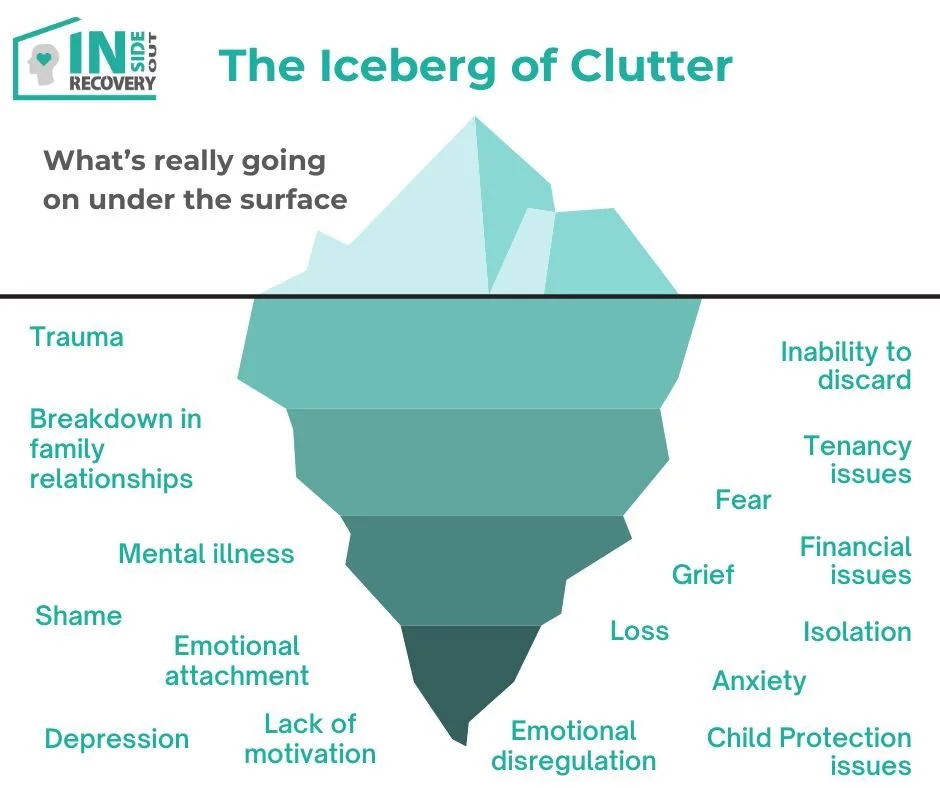What is Hoarding and Squalor?
Understanding Hoarding Disorder and Severe Domestic Squalor
Many people mistakenly believe that Hoarding Disorder (HD) and Severe Domestic Squalor (SDS) are the result of laziness or poor choices. In reality, these are complex mental health conditions that deserve compassion, not judgment. Misunderstandings like these only deepen the stigma and shame that individuals already carry, making it harder for them to seek help.
It’s Not About the ‘Stuff’
Think of an iceberg: what we see above the surface, the clutter or uncleanliness, is only a small part of the story. The real challenges lie beneath, in the emotional and psychological layers that are often invisible to others. For those living with HD or SDS, possessions may represent safety, memory, identity, or even grief. Discarding them can trigger intense anxiety and distress.
Two Distinct but Overlapping Conditions
HD and SDS are separate conditions, though they can coexist. Both are often accompanied by other challenges such as trauma, chronic health issues, substance use, or other mental health disorders. People living in squalid conditions may experience long term self neglect, which can lead to serious health risks and difficulty using their home as intended.
The Ripple Effect
These conditions don’t just affect the individual, they impact families, relationships, and communities. Shame and fear of judgment often lead to isolation, which only worsens the situation. Family breakdowns, financial strain, and housing instability are common consequences.
Why Letting Go Is So Hard
If you or someone you know is struggling with clutter, it may be rooted in past trauma or loss. Possessions can hold emotional, sentimental, or symbolic value. You might feel a strong responsibility to keep items “just in case,” or fear that letting go means losing a part of yourself or your memories.
These beliefs are deeply personal and valid. That’s why support must be respectful, patient, and tailored to each individual’s needs.
Moving Toward Support and Recovery
Living in a cluttered or squalid environment can affect your health, relationships, finances, and connection to the community. But with the right support, understanding, and long-term intervention, it is possible to reclaim not just your space but your sense of self and belonging.
The Role of Counselling in Recovery
Understanding the behaviours behind hoarding and squalor is only part of the journey, healing also requires support. Counselling provides a safe, non judgmental space to explore the emotional roots of these behaviours, such as trauma, grief, or anxiety. It can help individuals develop new coping strategies, challenge unhelpful beliefs, and build confidence to make lasting change.
Clearing a space is one thing, clearing the emotional weight behind it is another. With the right therapeutic support, people can begin to reclaim not just their homes, but their sense of self.
Hoarding
Squalor
The purpose of an assessment is to assess both the level of squalor/hoarding and also the impact that it has on your life and on other people.
If you believe that you may have either a HD or SDS or both, your local GP will be able to make a diagnosis. However, it will be important to let your GP know if you believe you have a hoarding issue. If you think you may be at risk, you will find self-assessments and questionnaires for you to complete in our resources section to help you know if you may be at risk. Other health professionals that can provide you with a diagnosis are clinical psychologists, psychiatrists, or a Mental Health Nurse Practitioner.
You may feel shame and embarrassment and a reluctance to disclose the problem for fear of being judged or stigmatised, however in order to receive the help and appropriate links to services, you will need to be open and honest about your situation. Your GP or other health professionals will ask you questions to identify and diagnose if a HD is present.
Extreme clutter dominates time, space, and personal functioning for you and for other family members.
Living in a cluttered environment can affect your health, support networks, finances, and your ability to connect to the community around you.



